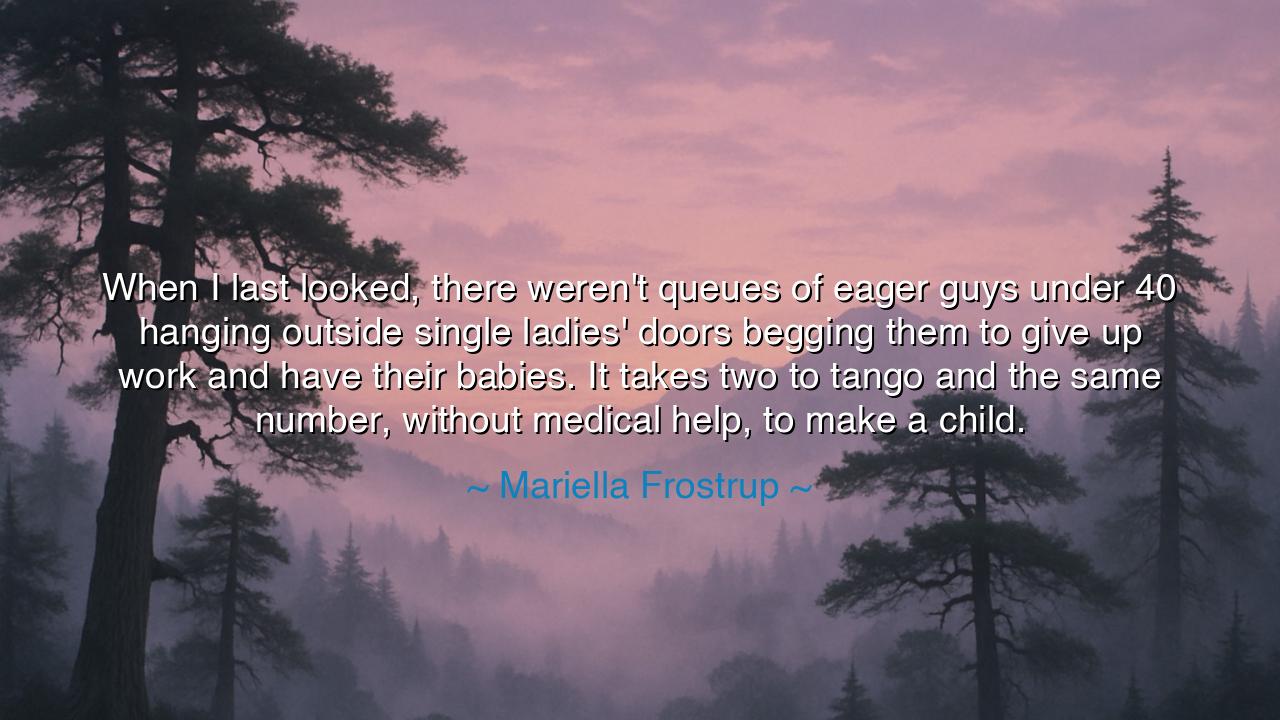
When I last looked, there weren't queues of eager guys under 40
When I last looked, there weren't queues of eager guys under 40 hanging outside single ladies' doors begging them to give up work and have their babies. It takes two to tango and the same number, without medical help, to make a child.






When Mariella Frostrup declared, “When I last looked, there weren’t queues of eager guys under 40 hanging outside single ladies’ doors begging them to give up work and have their babies. It takes two to tango and the same number, without medical help, to make a child,” she spoke with both sharp wit and timeless wisdom. Her words, though dressed in humor, carry the weight of justice: that the burdens and expectations of creation and parenthood must not be heaped upon women alone. In this statement lies a challenge to old traditions and a call for fairness, reminding us that responsibility, like love, is meant to be shared.
The meaning of her quote rests in its unveiling of imbalance. For centuries, women were told their sole purpose was to bear children, often at the expense of education, ambition, and labor outside the home. Meanwhile, men could move freely, unbound by the same weight of expectation. Frostrup’s words shine like a torch upon this injustice, asking the simple question: where are the eager men ready to sacrifice their lives and careers for parenthood? Her answer, drawn from observation, is clear — there are none queuing at women’s doors. Thus, the demand placed upon women is exposed as not only unequal but absurd.
The phrase, “it takes two to tango,” reaches back to an ancient truth: creation is a union. In the natural order, a child is not formed by one, but by two. This is both a biological reality and a spiritual one. To forget it, to place the full responsibility upon the shoulders of one, is to break the balance of life. Frostrup reminds us that nature itself testifies against inequality, that parenthood is not a solitary task but a shared endeavor, both in its beginnings and in its lifelong labor.
History provides us with echoes of this same struggle. In the early suffrage movements of the nineteenth and twentieth centuries, women who sought the vote were often told to remain in their homes, to bear babies instead of raising their voices. Yet when wars came, and nations needed hands to till the land or forge weapons, those same women were summoned to the factories, toiling with strength equal to men. Afterward, they were told again to retreat. The hypocrisy was plain, and it was broken only by the courage of those who, like Frostrup, dared to say: work and creation, labor and love, belong equally to men and women.
The lesson for us, then, is as vital today as it was in the past: do not demand from another what you will not give yourself. If society expects women to give up careers for the sake of children, then society must ask: where are the men making the same sacrifices? Balance requires honesty, and honesty demands shared responsibility. To raise a child is the noblest of tasks, but it is not a woman’s burden alone; it is the dance of two souls, the labor of two hands, the sacrifice of two lives intertwined.
Practical actions flow from this truth. Men must step forward as equal partners in both creation and care. They must share the duties of parenting — not only the act of conceiving a child, but the daily, humble labors of nurturing one. Women must be honored not only as mothers but as workers, thinkers, and leaders, with the freedom to choose paths beyond the hearth if they so desire. And society must cease its double standards, recognizing that the responsibilities of life and love are not divided by gender, but shared by humanity.
Thus, Frostrup’s words, though spoken with humor, should be carved in stone as a warning to future generations: the dance of life is a tango, and no one dances it alone. May we remember that equality is not a gift but a duty, that fairness is not a luxury but a law of nature. Let men and women alike stand shoulder to shoulder, bearing together the weight of work and the wonder of children, until the world itself is reshaped into harmony.






AAdministratorAdministrator
Welcome, honored guests. Please leave a comment, we will respond soon